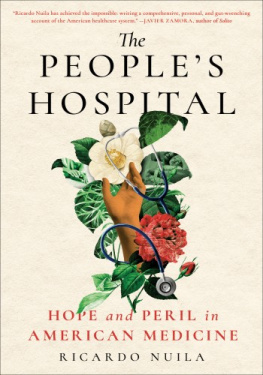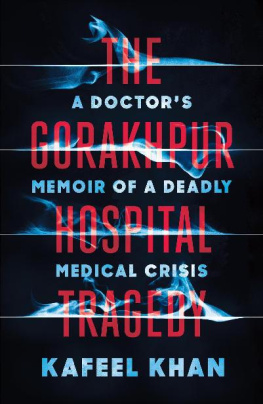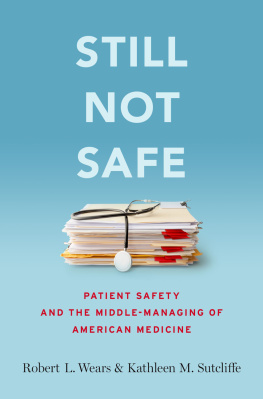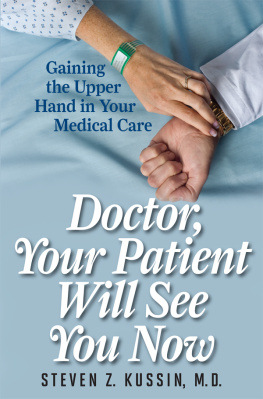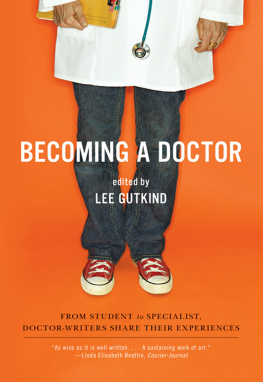
The author and publisher have provided this e-book to you for your personal use only. You may not make this e-book publicly available in any way. Copyright infringement is against the law. If you believe the copy of this e-book you are reading infringes on the authors copyright, please notify the publisher at: us.macmillanusa.com/piracy.
For my mother
For Sonia
And for Mohan and Piaalways, always
Contents
Wholly unprepared, we take the step into the afternoon of life; worse still, we take this step with the false assumption that our truths and ideals will serve as before. But we cannot live the afternoon of life according to the program of lifes morningfor what was great in the morning will be little at evening, and what in the morning was true will at evening have become a lie.
Carl Jung
Prologue: Storm
I am walking on a muddy path. The rain has ceased, and puddles are shimmering in the moonlight. I am wearing olive green Gap pants, beat-up Hugo Boss shoes, and an orange Patagonia Windbreaker. I am the picture of success.
I start to run. Trees and poles hurtle past me as head down, eyes fixed, I sprint down the trail. Wet leaves scrape against my face as I swat them away. Shadows oscillate. The wind is swirling like a loud yawn from heaven. I stumble on roots, but I keep on going.
Sleep has been hopeless. I havent been able to nod off for more than a few hours at night, and sedatives leave me even groggier the following day. A strange feeling has taken hold of me, and it wont let go. It isnt anger, I told Dr. Adams, my psychiatrist, as much as butterflies in the stomach.
Why the anxiety?
I dont know, but I am waking up with it and the workday hasnt even begun. How do I make it stop?
My pants catch in nettled bramble. The cloth rips slightly as I struggle to free myself. I finally stop and gaze into the still blackness. A faint light glows in the distance, refracting through my spectacles into an array of crystals. In the damp weedy grass around me, crickets chirp in angry unison. A nearby branch quivers where a creature must have just departed. I begin to jog again. Misty droplets, heavier and more urgent, peck at my face until the sky opens up to release a downpour. I sprint home. You can speed up after an accident, but you never make up for lost time.
Introduction: Medicine at Midlife
A certain amount of dissatisfaction may be inherent, even necessary, to the practice of medicine.
Abigail Zuger, The New England Journal of Medicine , 2004
When I look at my career at midlife, I realize that in many ways I have become the kind of doctor I never thought Id be: impatient, occasionally indifferent, at times dismissive or paternalistic. Many of my colleagues are similarly struggling with the loss of their professional ideals. Of course, the relinquishment of ones ideals is standard fare in the midlife phase. In this period, fundamental questions about life often arise: What is its purpose? What is my ultimate aim? Depression and nostalgia can take hold as middle-aged adults struggle with responsibility, regret, and the nagging awareness that their lives are half over.
I used to think that my life would settle down when I got to this stage, but I was wrong. The insecurity and ambivalence of my youth have persisted, though in different forms. In my twenties, hamstrung by my passions, I yearned for consistency in my core beliefs. I obsessed about what I was going to do with my life. Those ruminations now seem like luxuries. The challenges I face nowsupporting my family, navigating the precarious domains of job, marriage, and fatherhood while trying to maintain personal and professional integrityseem so much bigger (if no less insoluble). As a young adult I believed that the world was accommodating, that it would indulge my ambitions. In middle age, reality overwhelms that faith. You see the constraints and corruption. Your desires give way to pragmatism. The conviction that anything is possible is essentially gone.
It occurs to me that my profession is in a sort of midlife crisis of its own. In the last four decades, doctors have lost the special status they used to enjoy. In the mid-twentieth century, at least, physicians were the pillars of any community. They made more money and earned more respect than just about any other type of professional. If you were smart and sincere and ambitious, the top of your class, there was nothing nobler or more rewarding that you could aspire to become. Doctors possessed special knowledge. They owned second homes. They were called upon in times of crisis. They were well-off, caring, and smart, the best kind of people you could know.
Today medicine is just another profession, and doctors have become like everybody else: insecure, discontented, and anxious about the future. In surveys, a majority of doctors express diminished enthusiasm for medicine and say they would discourage a friend or family member from entering the profession. In a 2008 survey of twelve thousand physicians, only 6 percent described their morale as positive. Eighty-four percent said their incomes were constant or decreasing. The majority said they did not have enough time to spend with patients because of paperwork, and nearly half said they planned to reduce the number of patients they would see in the next three years or stop practicing altogether. American doctors are suffering from a collective malaise. We strove, made sacrifices, and for what? For many, the job has become only thata job.
Consider what a couple of doctors had to say on Sermo, the online community of more than 125,000 physicians:
I wouldnt do it again, and it has nothing to do with the money. I get too little respect from patients, physician colleagues, and administrators, despite good clinical judgment, hard work, and compassion for my patients. Working up patients in the ER these days involves shotgunning multiple unnecessary tests (everybody gets a CT!) despite the fact that we know they dont need them, and being aware of the wastefulness of it all really sucks the love out of what you do. I feel like a pawn in a money-making game for hospital administrators. There are so many other ways I could have made my living and been more fulfilled. The sad part is we chose medicine because we thought it was worthwhile and noble, but from what I have seen in my short career, it is a charade.
Another wrote:
I loved what I did, running an ICU. But I was on call 11 of every 14 days for more than 25 years. Over a third of my work weeks were 100 hours. I quit when I was 56 because my wife developed a terminal illness and I wanted to return all the lost hours I had promised her when we retire. In my last year of practice I asked the billing department to collect all the actual money we had collected on one particularly long and difficult weekend on call After overhead, I was actually paid $11.74/hour. Who would do that again? Fool that I am, I probably would, but my wife and I brought up our sons from an early age to be totally against the idea of medical school. They were clearly bright enough, with full academic scholarships. And while they respect physicians, they are not doctors. And I am glad they are not.
The discontent is alarming, but how did we get to this point? This book, chronicling my experiences in my first few years as a new doctor, is my attempt to answer this question.
* * *
A decade ago, the economist Julian Le Grand developed the idea that public policy is grounded in a conception of humans as knights, knaves, or pawns. Knights are motivated by virtue. They want to make the world a better place. Knaves are selfish. They desire to extract as much as possible for themselves. Pawns are passive. They follow external rules and regulations rather than an internal code of conduct.
Next page

